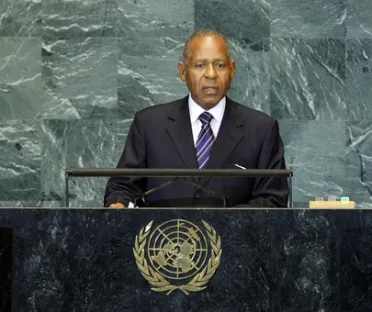Statement
Statement summary
MANNING, Prime Minister of Trinidad and Tobago, said that, while the world was beginning to emerge from the global recession, unemployment continued to grow, credit remained contracted and consumer confidence remained very low. Further recessionary trends were also possible. Every country must be wary of the adventurous attitude of leading financial institutions, which had led all to the edge of the economic precipice. “In the globalized economy, we are all affected by policies or actions that direct the international financial system.” That was particularly true of the smaller countries and the developing world, especially in the Southern Hemisphere, where the prospects had grown for increased poverty, unemployment and backsliding in the development process.
He said that the world’s trust in totally unregulated markets had been misplaced. It was time to reform the international economic system to take in new realities, including new and emerging centres of economic power and the now indispensable need to deliberately generate growth in the developing world. He was heartened by new developments and decisions among the G-20 countries. There must be no reversal of that approach, which recognized that development everywhere translated into prosperity for all. Reform of international financial institutions must ensure greater sensitivity to the needs of countries at differing levels of development, as new voices representing more of humanity were made part of the decision-making process and resource flows for trade and investment were realized.
Turning to the Caribbean Community (CARICOM), he said that most of its States were experiencing economic contraction and rising unemployment levels. It was regrettable that some Member States, as well as middle-income countries, might not be eligible for funding under some World Bank facilities for international development assistance. As highlighted at the 2008 Conference in Namibia, enhanced levels of international development assistance was necessary for those countries, but the current categorization did not accurately reflect their needs. He asked the General Assembly to take steps to advance the cause of middle-income countries in the matter.
He also spoke of the need for greater attention to promote peace and security in Haiti, and the need for all Western Hemisphere nations to contribute to the proposed Hemispheric Fund for Haiti, proposed by Trinidad and Tobago. He would be bringing the matter before the General Assembly for its support.
On security, he emphasized the problem of organized transnational crime, including terrorism, and illegal trafficking in drugs, arms and persons. Drug trafficking particularly afflicted the Caribbean as a transhipment route to North America and Europe. That had a corrosive effect on the region’s small societies. CARICOM was pooling resources to combat the problem, but it needed greater resources. He encouraged Member States to negotiate a legally binding arms trade treaty. The security situation in the region had been aggravated by the deteriorating economic situation, weakened by the loss of preferential markets for bananas and sugar and the failure of expected returns from both the tourism industry and the financial services sector, he added.
Concerning climate change, he rejected the per capita basis for determining levels of carbon emission, as unfair to small, energy-producing, developing countries, such as Trinidad and Tobago. Absolute emissions provided a more just method. Trinidad and Tobago had already embarked on emission reductions by pursuing renewable sources. Trinidad and Tobago would be hosting the last major summit before the Copenhagen summit in December, where it would attempt to forge a consensus between both high greenhouse gas emitters and some of the countries most threatened by climate change.
At the same time, greater attention must be paid to non-communicable diseases, as forecasts indicated that they would account for about 73 per cent of global deaths and 60 per cent of the global burden of disease. He called for indicators on those diseases to be integrated into the core monitoring of Millennium Development Goals progress and evaluation, and proposed a special session of the General Assembly on the issue. He regretted the lack of progress towards implementing the food security Goal by 2015, adding that a greater sense of urgency was needed. All countries must honour the commitments made at the 2008 World Summit on Food Security. Hopefully, the next such summit would bolster achievement of the revised target of 2025, set by the Food and Agriculture Organization (FAO).
On United Nations reform, he said that democracy and representation were key to achieving meaningful and effective multilateralism and, towards that goal, he expressed support for Security Council reform. The composition of that body must better reflect the global geopolitical realities in play since the end of the Second World War.
Full statement
Read the full statement, in PDF format.
Photo

Previous sessions
Access the statements from previous sessions.
